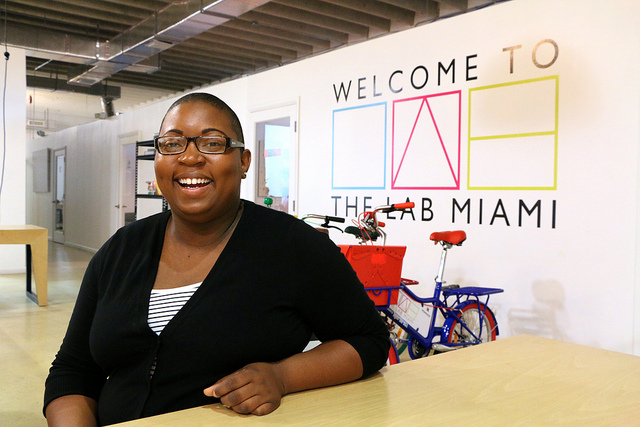
Code Fever, helping South Florida communities ‘get up to code’
Above: Co-founder Felecia Hatcher at The LAB Miami. Credit: Carolina Wilson.
When South Florida entrepreneur Felecia Hatcher looks at computer code she sees opportunity.
That’s why the co-founder of Code Fever has been spending many of her days teaching students to see that HTML, CSS and JavaScript can be important tools in building their futures. Last week she was encouraging a group of about 15 students as part of GenTech, a 10-day business accelerator.
The camp was co-sponsored by three organizations supported by Knight Foundation: the Network for Teaching Entrepreneurship, The LAB Miami and Code Fever, which Hatcher and her husband, Derick Pearson, co-founded in 2013. The nonprofit empowers underprivileged communities by increasing the number of students between the ages of 13 and 21 who code, create technology and become entrepreneurs within their communities. A $75,000 grant from Knight will enable Hatcher and Pearson to expand Code Fever’s work.
“There are large disparity numbers when you are talking about tech access and tech innovation, especially in some of our most impoverished communities here in South Florida,” said Hatcher, who is also an author and co-founder of frozen confection company Feverish Ice Cream. “We want to equip the students and the parents with the tools they need to be innovators in their communities.”
While some of these underserved communities may have access to technology, Hatcher said consumption is not enough; people in the communities must be encouraged to create.
“They’re walking around with smartphones; they have access to computers,” Hatcher said. “But a lot of them are not actually creating the technology that they are using, or even understand that it’s a possibility for them as a career path or an entrepreneurial path.”
This exposure of communities to technology has been Code Fever’s greatest challenge.
“In my field, we throw around words like ‘coding’ and ‘technology’ and ‘entrepreneurship’ all the time, but for a lot of students and their parents that is not an everyday conversation, nor is it anything that they think they could be a part of,” said Hatcher, who TechCocktail Miami recently named as one of “5 Women to Watch in #MiamiTech.”
Hatcher wants those concepts to be part of long-term career goals for students.
“With coding skills and with these tools, they can learn to build their own startups,” Hatcher said. “Then these students don’t have to deal with these jobless numbers their communities have; they can have the skills they need to create their own jobs, create jobs for their families and their friends.”
The students, then, acquire another tool: the ability to transition from being students to teachers, like Hatcher, who has been honored by the White House as an African-American STEM Champion of Change. She and Pearson also founded the Black Tech Miami Meetup Group, and she helped launch Black Girls Code in Miami.
“We’re building this really cool ecosystem in South Florida,” Hatcher said. “We’re hoping to equip kids with the skills so that they can in turn go home and also be able to sit down at the computer [with] their parents and teach them how to code.”
The Knight grant will accelerate that work.
“It’s really going to allow us to have a broader reach with the programming that we’re trying to do,” Hatcher said. “Moving from just being a one-day Saturday program, to being able to do something on an every weekend consistent basis or an every week basis, will be huge for the students that we’re working with and their parents.”
But that’s not all.
“The grant will [help us] to further expand within the tri-county area,” she said, “and get into even more schools and get more kids coding and more kids building startups.”
Carolina Wilson is an editorial intern at Knight Foundation.
Recent Content
-
Communitiesarticle ·
-
Communitiesarticle ·
-
Communitiesarticle ·


